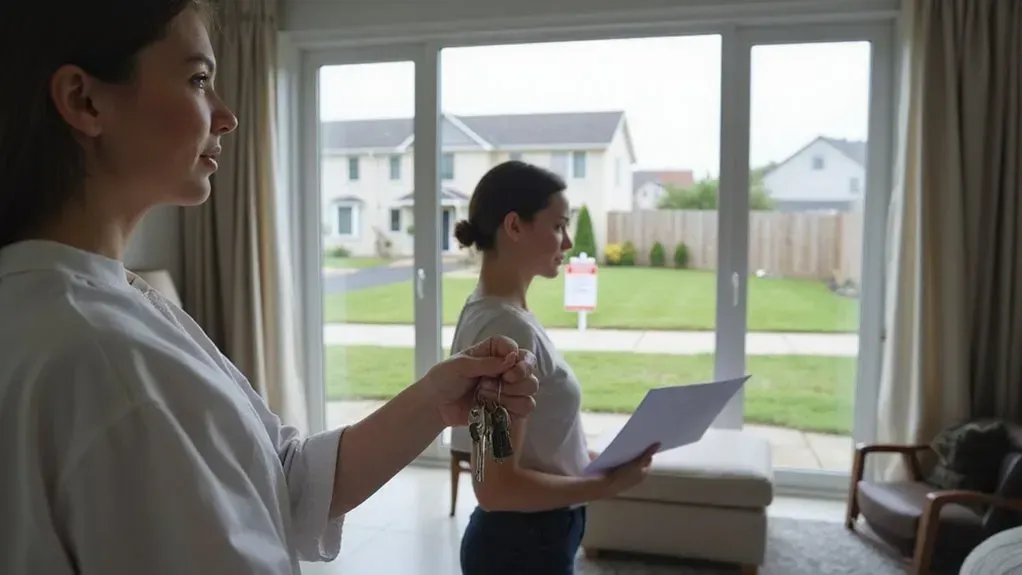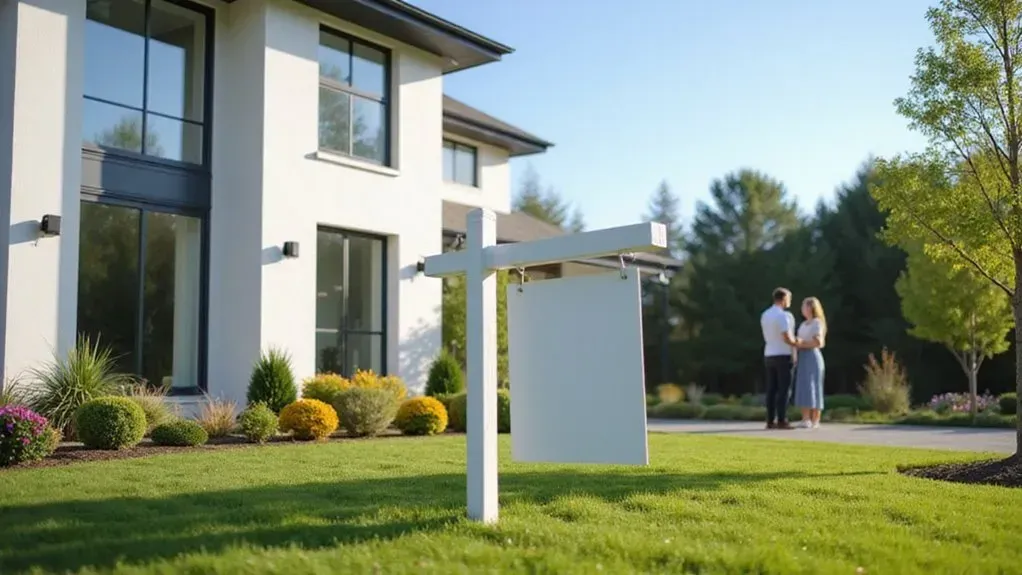
Amid crumbling marriages, the family home often becomes a battlefield of emotions and financial disputes. Selling your house during divorce creates legal complexities and potential conflicts between spouses at an already stressful time. However, with proper guidance and understanding of requirements, couples can navigate property sales successfully while protecting their financial interests.
Yes, you can sell your house during a divorce, but specific legal requirements must be followed based on your state’s laws. Both spouses typically need to provide consent for the sale, or court approval may be required if agreement cannot be reached.
In this blog I will explore everything related to selling your house during divorce proceedings.
Key Takeaways
- Selling a house during divorce requires court approval or both spouses’ consent, depending on state laws.
- Both parties must sign sale documents; proper legal documentation is essential to comply with property laws.
- Proceeds are divided per the divorce agreement, considering expenses, debts, and contributions, with potential tax implications.
- Alternatives include buyouts, co-ownership, or renting out the property to avoid immediate sale.
- Engaging experienced legal and real estate professionals helps navigate legal requirements and secure fair sale terms.
Can I Legally Sell My House During Divorce?

You can sell your house during divorce, but legal restrictions vary by state and situation. Courts may require both spouses’ consent or impose specific orders that affect the sale.
Acting without proper approval risks legal penalties and delays, so understanding court rules and state laws is essential.
Legal Considerations in Different States
State laws significantly impact how you sell a house during divorce. Community property states require court approval or mutual consent before selling marital property.
Equitable distribution states follow different rules but still require legal compliance. Failure to follow proper procedures can result in penalties and delays. These legal hurdles often complicate your financial goals during an already difficult time.
In addition, paperwork requirements vary by jurisdiction and can cause unexpected roadblocks. A qualified attorney can guide you through these requirements.
They help ensure a compliant, efficient sale process. Your attorney will protect your interests while navigating complex property division laws.
Common Legal Restrictions to Be Aware Of Courts impose several key restrictions during divorce proceedings. You can’t sell or transfer the marital home without court approval.
These restrictions include court orders, consent requirements, and protections for fair asset division. Any attempt to bypass these rules can result in penalties.
The purpose of these limitations is to protect both parties’ interests. Courts want to ensure property is divided fairly.
Unauthorized property transfers may be considered unlawful conveyance under state laws. Furthermore, violating these restrictions often leads to delays in your divorce settlement.
Always consult with a divorce attorney before making any property decisions. In many cases, proper legal guidance can help avoid complications.
Court Orders and Their Impact on House Sales
Courts can prevent home sales during divorce proceedings until final asset division occurs.
You need court approval or your spouse’s written consent before listing or selling a property during divorce.
Attempting to sell without proper authorization may result in contempt charges or legal penalties.
This protection ensures both parties receive fair treatment in property division. To avoid complications, consult with a family law attorney before making any property decisions.
Furthermore, getting the proper documentation saves time and prevents costly legal battles later.
Who Has the Right to Sell the House?

You need to know who’s the legal right to sell the house, which depends on ownership status, joint ownership, and the title or deed.
If both names are on the title, both must agree or the court must order the sale. Failing to follow these rules can delay the sale, cost money, or lead to legal penalties.
Determining Home Ownership Status
Home ownership during marriage falls into either separate or marital property categories. State laws determine how these categories are defined and divided.
Separate property belongs solely to one spouse. Marital property belongs to both spouses equally.
The classification depends on when and how the home was acquired. Homes purchased before marriage typically remain separate property. However, properties bought during marriage usually become marital assets.
Courts examine title documents, mortgage records, and financial contributions when determining ownership status.
As a result, proper classification ensures fair division and prevents legal disputes during divorce proceedings.
Joint Ownership Implications
Joint owners must agree on property decisions during divorce. Neither spouse can sell without the other’s consent. Court intervention becomes necessary if you can’t reach an agreement.
The law allows courts to order partition sales when joint owners remain at an impasse. This forced sale often yields lower profits than cooperative selling. Legal guidance helps navigate these complex situations effectively.
Communication remains your best tool for resolving joint ownership issues. A fair resolution typically saves money, time, and emotional stress. Mediation offers an alternative to lengthy court battles.
Title and Deed Considerations
Both spouses typically have legal interests in the home through title and deed during a divorce. This shared ownership means you need mutual consent or court approval to sell the property.
Legal rights to the house affect sale timing, ownership transfer, and how money gets divided.
Understanding these elements helps streamline the selling process. The title shows who legally owns the property. The Title deed serves as the actual transfer document when you sell.
Furthermore, property acquired during marriage usually qualifies as marital property regardless of whose name appears on documents.
Courts consider multiple factors when determining how to divide property equitably between divorcing parties.
What Happens to the Proceeds from the Sale?

When the house sells, the proceeds are divided based on your divorce agreement or court order, accounting for expenses like mortgages, liens, and commissions.
You need to ensure debts are paid off first, so the remaining funds can be fairly split, often 50/50 but sometimes differently.
Also, consider tax implications, since capital gains exclusions can impact your net profit, making timely and accurate division crucial.
Division of Equity and Profits
Courts divide house sale proceeds during divorce according to legal orders or your divorce agreement. The division accounts for mortgage payoffs, realtor commissions, and closing costs before determining profit shares.
In community property states, profits typically split 50/50 between spouses. However, individual contributions to the property can affect the final distribution.
Each spouse may receive different percentages based on home improvements or initial down payments. The final settlement depends on your specific situation and local laws.
Furthermore, documentation of financial investments in the property strengthens claims for larger portions of the proceeds.
Handling Existing Mortgage and Debts
Existing debts must be settled before dividing property sale proceeds during divorce. The mortgage balance gets paid off at closing.
All selling expenses, including realtor commissions and closing fees, are deducted from the total amount.
If one spouse keeps the home, refinancing removes the other’s name from the loan. Home equity loans and other property-linked debts must be paid from the proceeds before distribution.
This process creates a clean financial break between former spouses. Taking these steps ensures both parties receive their fair share of equity.
Furthermore, resolving all property-related obligations prevents future financial entanglements.
Tax Implications of Selling During Divorce
You may face significant tax consequences when selling your home during divorce. Married couples can exclude up to $500,000 in tax-free capital gains from taxes if they meet IRS requirements. Single filers can only exclude $250,000.
Timing matters greatly in these situations. The tax outcome depends on several key factors. You must have owned and lived in the home for at least two of the five years before the sale.
Property title and divorce agreement details also affect your tax liability. Consider consulting a tax professional before finalizing any sale. This expert guidance helps prevent costly mistakes and ensures you receive all eligible tax benefits.
How to Sell Your House During a Divorce?
To sell your house during a divorce, you need both parties’ consent or a court order to move forward quickly and avoid legal delays.
Working with experienced divorce attorneys and a knowledgeable real estate agent ensures you stay compliant and get the best deal.
Quickly setting the right price and preparing the home for sale maximizes profits and minimizes time on the market.
Getting Consent from Both Parties
Both spouses must agree to sell your house during divorce. This protects everyone’s legal interests and prevents costly delays.
Start by discussing sale terms openly with your spouse. Put all agreements about the sale proceeds in writing. Legal requirements include signatures from both parties on all sale documents.
Consider involving an attorney to review paperwork. Furthermore, mutual consent helps avoid court interventions. A clearly documented agreement creates transparency for all parties involved. Most states require spousal consent for property sales during divorce proceedings.
Working with Divorce Attorneys
Divorce attorneys assist in home sales by protecting your legal rights during separation. They draft necessary documents, secure court approval, and negotiate favorable terms.
State laws about property division vary, requiring expert guidance for compliance. Your attorney serves as a mediator to minimize disputes between parties.
This support prevents costly mistakes and speeds up the selling timeline. In addition, attorneys ensure fair distribution of sale proceeds.
Court orders often dictate specific terms that must be followed exactly. Their expertise helps you navigate this difficult transition with confidence.
Selecting a Real Estate Professional
You need a real estate agents with divorce experience for selling jointly owned property. Look for professionals with excellent reputations and deep knowledge of your local market. Communication skills matter greatly during this process. The agent should remain neutral without favoring either spouse.
Good divorce-focused agents understand the emotional challenges involved. They work efficiently to get the best price for both parties.
Legal requirements for property sales during divorce vary by state. These professionals can coordinate with your attorneys when needed.
Choose someone who maintains clear boundaries and focuses on timely results. In the end, the right agent helps transform a difficult situation into a fair financial outcome.
Setting the Right Price
Price your home at market value to ensure a successful divorce-related sale. A comparative market analysis (CMA) or pre-listing appraisal establishes an accurate starting point. Both spouses must agree on this figure to avoid disputes later.
The right price typically leads to a faster sale, with most properly priced homes selling within 30 days. This timing can be crucial during divorce proceedings.
Fair pricing also helps achieve equitable property division. Your financial interests benefit from strategic pricing.
Overpriced homes often languish on the market and eventually sell for less. Conversely, reasonable pricing can attract multiple offers. This approach reduces stress during an already challenging time.
Preparing the Home for Sale
Your home needs strategic preparation to appeal to buyers during a pre-divorce sale. Start with a thorough inspection alongside your agent to spot critical repairs.
Agree with your spouse about staging investments before proceeding. The as-is selling option might work better for couples seeking faster resolutions.
A Comparative Market Analysis (CMA) helps establish an accurate, competitive listing price.
Furthermore, successful cooperation between divorcing parties directly impacts final sale values. Most buyers can sense tension, which may affect their purchase decision. Therefore, maintain a professional approach throughout showings and negotiations.
What Are the Financial Benefits of Selling?
Selling your house during divorce eliminates ongoing joint mortgage and maintenance costs, freeing up cash for your next chapter.
It also provides immediate liquidity, allowing both parties to access funds quickly and move forward.
Plus, a sale can reduce disputes over property upkeep and may offer tax advantages, maximizing your financial gains.
Eliminating Ongoing Joint Financial Obligations
Selling jointly owned property ends shared financial burdens during divorce. Married couples no longer make mortgage payments together after selling their home.
Property tax responsibilities stop immediately when ownership transfers to the new buyer. Both parties escape the drain of ongoing maintenance costs. The absence of these obligations creates financial independence.
Additionally, selling simplifies the divorce negotiation process. Former spouses can divide cash proceeds rather than manage complex shared assets.
Many couples find this arrangement reduces conflict during separation. As a result, each person gains financial clarity sooner.
Creating Immediate Liquidity for Both Parties
A home sale during divorce provides fast cash access for both spouses. This quick conversion of property into money helps each person move forward financially. The funds become available once closing occurs, typically within 30-45 days.
Selling the house eliminates the need to determine complex asset values during property division. The resulting cash is easier to split according to court orders or agreements. Proceeds can pay off the existing mortgage and cover mounting legal expenses. Furthermore, each person gains financial independence to secure new housing.
Many divorcing couples also benefit from tax advantages when selling their primary residence. In fact, couples can exclude up to $500,000 in capital gains from taxation under certain conditions.
Reducing Conflict Over Property Maintenance
Selling your home during divorce eliminates costly maintenance disputes. Former couples avoid arguments over repairs, utility payments, and property tax responsibilities. Property maintenance costs can decrease by 100% after sale completion.
The sale creates a clean financial break. You no longer need to coordinate schedules for home repairs. Additionally, neither party bears responsibility for unexpected expenses like roof damage or plumbing issues.
In the long run, this decision minimizes ongoing interaction about property matters. Most divorced couples report less stress after selling shared real estate. As a result, the divorce process becomes more straightforward and less contentious.
Potential Tax Advantages
Home sales during divorce offer tax benefits through the capital gains exclusion. Married couples can exclude up to $500,000 in profit from taxation when selling their primary residence. This advantage applies only when you sell while still legally married. Proper timing helps maximize these financial benefits.
The right strategy protects your wealth during this difficult transition. You must meet certain ownership requirements to qualify. The home must have been your primary residence for at least two of the five years before selling.
Additionally, proper documentation ensures you receive all eligible tax breaks. This tax exclusion can significantly reduce your financial burden during divorce proceedings.
What Are the Alternatives to Selling?
If selling isn’t your only option, you can consider buying out your spouse’s share, delaying the sale through a deferred arrangement, or even co-owning the property after divorce.
Renting out the home offers ongoing income and postpones the need for immediate sale. These alternatives can maximize your financial benefits and reduce emotional stress—so act quickly to determine the best approach for your situation.
Buyout Options for One Spouse
A spouse buyout allows you to keep the home after divorce by paying your ex-partner their share. You must first get an appraisal to establish the home’s current market value.
Next, work together to agree on a fair buyout amount based on equity split. Most states require a 50/50 division of marital property unless otherwise specified in a prenuptial agreement.
Financial options include cash payment, refinancing the mortgage, or using a home equity line of credit.
As a practical step, obtain pre-approval from lenders to confirm you qualify to refinance solo. Furthermore, consult with a tax professional about potential capital gains implications.
Deferred Sale Arrangements
Deferred sale arrangements postpone property division during divorce. You and your ex keep joint ownership until a set future date. This approach eases financial pressure and reduces immediate conflict.
Both parties share in any property appreciation over time. A detailed written agreement is crucial for this arrangement. Legal documentation must specify each person’s rights and responsibilities regarding mortgage payments and maintenance costs.
Courts typically require formal approval for these arrangements. The main advantage is breathing room during a challenging transition. Postponing the sale allows everyone to adjust and make better financial decisions.
Furthermore, this setup helps preserve family stability, especially when children are involved. Meanwhile, both parties continue building equity in the property.
Continuing Co-Ownership After Divorce
Yes, you can maintain co-ownership of property after divorce. This arrangement works best when both parties want financial stability or need to preserve family continuity.
Success requires clear agreements. Draft a formal co-ownership agreement covering mortgage payments, property taxes, and maintenance responsibilities.
Consider renting the property to generate income. Establish a specific timeline for eventual sale or buyout.
Open communication prevents conflicts. Regular check-ins about property matters help maintain a business-like relationship.
Additionally, consulting with a financial advisor ensures both parties understand the long-term implications.
Renting Out the Property
Renting offers a viable alternative to selling during divorce proceedings. It provides consistent income while you finalize separation terms. A well-crafted rental agreement prevents future conflicts between divorcing spouses.
Both parties should decide who handles maintenance issues and how expenses will be split. This approach helps maintain stability for children during an uncertain time. Your family home continues to serve its purpose while generating revenue.
The rental income may offset mortgage payments and potentially yield additional profit. Many divorcing couples find this arrangement beneficial until they reach final property decisions.
Why Consider Selling to a Cash Buyer During Divorce?
Selling to a cash buyers speeds up the transaction, helping you settle divorce matters quickly and smoothly.
It eliminates the need for repairs or staging, saving time and reducing costs. Plus, the simplified paperwork and fewer contingencies lower emotional stress and keep the process on track.
Speed and Convenience Benefits
Cash buyers accelerate the divorce home sale process significantly. You can close within 7-14 days instead of months.
A cash sale eliminates mortgage approval delays that often derail traditional sales. The property sells “as is” without repairs or staging requirements.
This approach simplifies negotiations and reduces emotional stress during an already difficult time.
No open houses or showings are needed. The entire transaction follows a straightforward process with minimal paperwork.
Moreover, a quick sale helps both parties move forward faster with separate lives. The simplified process provides certainty when you need it most.
Avoiding Costly Repairs and Staging
Cash buyers purchase homes “as-is,” eliminating repair and staging expenses during divorce. You won’t need to spend money fixing issues or preparing the property for showings. This approach preserves more of your equity for both parties to share.
The process moves quickly without inspection contingencies or staging delays. Many divorcing couples appreciate the simplicity when emotions are already strained.
Additionally, you can skip cleaning, decluttering, and maintenance tasks that traditional sales require.
In most cases, cash offers close within 1-2 weeks rather than months. This faster timeline helps families move forward and establish new living arrangements sooner.
Reducing Emotional Stress of Traditional Sales
Cash buyers simplify property sales during divorce by eliminating common stressors. They offer fast closings, often in as little as 7-14 days.
You won’t need to make repairs or stage your home for multiple showings. The process involves minimal negotiations and eliminates the back-and-forth of traditional sales.
No need to schedule or prepare for endless property viewings. Additionally, you can skip the appraisal process that often delays traditional sales.
This streamlined approach creates emotional space during a difficult life transition. Many sellers find the simplicity provides needed relief when emotions are already strained.
Simplified Paperwork Process
Cash home sales require far less documentation than traditional sales during divorce. Standard home sales involve loan applications, inspections, and lender requirements. Cash transactions eliminate these steps entirely. You’ll only need basic ownership and transfer documents.
The streamlined process cuts weeks or months from your timeline. This efficiency helps both parties access funds faster for property settlement.
Most cash home sales complete in 7-14 days compared to 30-60 days for traditional sales. Furthermore, fewer contingencies mean reduced legal complications. This simplicity creates a cleaner break for divorcing couples needing closure.
Ready to Sell Your House During Divorce? Contact Jay Primrose Properties Today
Jay Primrose Properties can help you sell your home during divorce proceedings. Our team specializes in handling sensitive property sales during marital separation.
We provide accurate home valuations to ensure fair market pricing. Our experts navigate court requirements and legal documentation needed for divorce property sales.
The divorce process becomes less stressful with our coordinated approach. We manage showings, negotiations, and paperwork efficiently.
Furthermore, our team works to maximize your sale proceeds through strategic marketing and timing. Property division laws require specific documentation that we help prepare. In short, we handle the complexities while you focus on moving forward.
Frequently Asked Questions
What Money Can’t Be Touched in a Divorce?
You can’t touch inheritance, gifts, personal injury settlements, or premarital funds in divorce. Protect these assets to serve your best interests, preserve your wealth, and ensure a smooth process—time is money, so act wisely now.
Why Is Moving Out the Biggest Mistake in a Divorce?
Moving out weakens your negotiating position, reducing your claim to assets and custody. Stay in the home to protect your rights, maintain stability, and ensure you’re maximizing your advantage for a fair divorce settlement quickly and effectively.
Can You Sell Things While Going Through a Divorce?
Envision trying to sell a boat without the captain’s permission—selling assets during divorce without consent risks legal penalties and delays. You must get approval or court order first, or face costly, time-consuming disputes.
Is It Better to Sell Your House Before or After a Divorce?
Selling your house before divorce speeds up asset division, reduces legal complexities, and maximizes tax benefits. Act now to provide financial clarity, help your partner move forward, and secure the best outcome for everyone involved.
Give us a call anytime at 253-697-0007 or fill out this quick form to get started today!
Get A Fair Cash Offer On Your House

About the author
Justin Baker
Justin Baker is the founder of Jay Primrose Properties, a leading cash home buying company based in Tacoma, WA. With a passion for real estate investing, Justin has helped numerous homeowners in the Pacific Northwest region sell their homes quickly and hassle-free. Justin believes that buying and selling real estate should be a seamless process and works tirelessly to ensure that his clients have a stress-free experience. With a deep understanding of the local real estate market and a commitment to exceptional customer service, Justin has established himself as a trusted and reliable cash home buyer in Tacoma and the surrounding areas.











